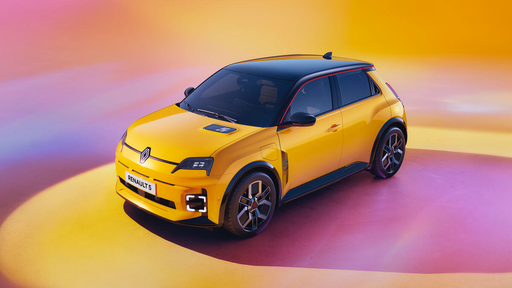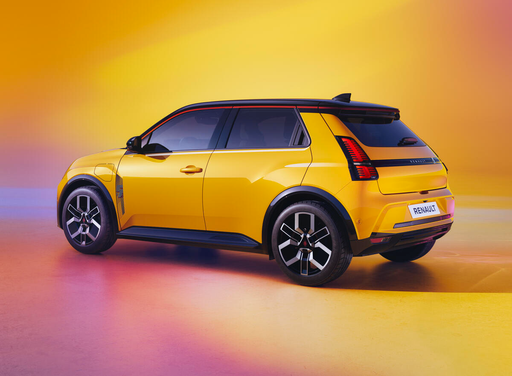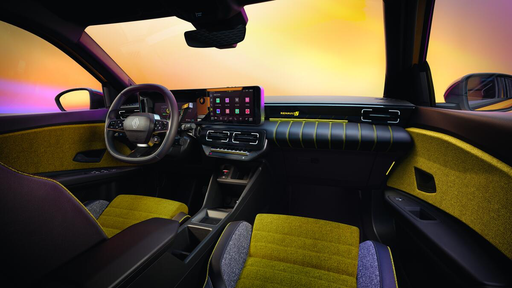Toyota Yaris VS Renault R5 – Specs, Efficiency & Price Comparison
Which model is the better choice – the Toyota Yaris or the Renault R5? We compare performance (280 HP vs 540 HP), boot capacity (286 L vs 326 L), efficiency (3.80 L vs 14.80 kWh), and of course, the price (21900 £ vs 23900 £).
Find out now which car fits your needs better!
The Toyota Yaris (Hatchback) is powered by a Full Hybrid or Petrol engine and comes with a Automatic or Manuel transmission. In comparison, the Renault R5 (Hatchback) features a Electric engine and a Automatic gearbox.
When it comes to boot capacity, the Toyota Yaris offers 286 L, while the Renault R5 provides 326 L – depending on what matters most to you. If you’re looking for more power, you’ll need to decide whether the 280 HP of the Toyota Yaris or the 540 HP of the Renault R5 suits your needs better.
There are also differences in efficiency: 3.80 L vs 14.80 kWh. In terms of price, the Toyota Yaris starts at 21900 £, while the Renault R5 is available from 23900 £.
Compare all the key specs now and find out which model fits your lifestyle best!
In a head-to-head comparison, the Renault R5 and Toyota Yaris offer distinctive takes on compact car design and functionality. The Renault R5 impresses with its retro-modern aesthetic and nimble handling, making it a joy for urban driving. Meanwhile, the Toyota Yaris shines with its reliability and fuel-efficient performance, appealing to those prioritizing practicality and longevity.
Toyota Yaris
The Toyota Yaris exudes a charming blend of practicality and style, making it an appealing choice for urban drivers. Its compact design allows for easy manoeuvrability in crowded city streets, while the interior offers a surprisingly spacious and comfortable environment. With a focus on fuel efficiency and reliability, the Yaris remains a popular option for those seeking a balance between performance and economy.
details @ Toyota
@ Toyota
 @ Toyota
@ Toyota
Renault R5
The Renault R5 is a classic hatchback that captured the imagination of drivers with its distinctive design and compact versatility. Its agile handling and efficient performance made it a popular choice in urban settings and winding country roads alike. With a blend of style and practicality, the Renault R5 remains a beloved icon in automotive history.
details @ media.renault.at
@ media.renault.at
 @ media.renault.at
@ media.renault.at
 @ media.renault.at
@ media.renault.at
Renault R5 and Toyota Yaris: The Future of Compact Hatchbacks
The automotive landscape is evolving with great strides in technology, and today's compact hatchbacks are no exception. Here, we delve into a comparison between two prominent contenders: the Renault R5 and the Toyota Yaris. Each vehicle represents a bold step forward in terms of innovation and technical prowess. Let's explore these two models, focusing on their powertrains, efficiency, and overall appeal.
Powertrain and Performance
The Renault R5 embraces the electric future, equipped with an electric motor that produces up to 150 HP (110 kW) and an impressive torque of 245 Nm. The R5 offers a seamless experience with its automatic transmission and reduction gearbox, delivering power to the front wheels. Accelerating from 0 to 100 km/h in just 8 to 9 seconds, this electric marvel ensures a quick and smooth ride.
In contrast, the Toyota Yaris offers versatility with both full hybrid and petrol engine options. The hybrid variant generates 116 HP (85 kW), supported by a CVT gearbox for smooth transitions and a front-wheel or all-wheel-drive configuration. The petrol engine can boast up to 130 HP and comes with either a manual or automatic gearbox, allowing for flexibility depending on driver preference. The Yaris accelerates from 0 to 100 km/h in 9.2 to 9.7 seconds, proving its mettle in urban agility.
Efficiency and Range
The Renault R5 shines with its fully electric credentials, boasting a CO2 efficiency class of 'A' and zero emissions. It offers a consumption rate of 14.8 kWh/100km, making it an environmentally responsible choice. The R5 provides an electric range of approximately 300 to 405 km, supported by a 40 kWh battery capacity, making it a practical option for daily commutes and short trips.
The Toyota Yaris, meanwhile, provides a balanced efficiency with its hybrid model consuming merely 3.8 to 4.2 L/100km. The petrol version ranges between 8.7 and 9.5 L/100km, which aligns with its class standards. The hybrid's CO2 emissions stand between 87 to 95 g/km, offering a respectable compromise for traditional powertrain lovers who still value lower emissions.
Design and Versatility
Both vehicles share a hatchback body style but exhibit distinct characteristics. The Renault R5 measures 3922 mm in length, 1744 mm in width, and 1498 mm in height. Despite its compact size, it accommodates five passengers and offers a trunk capacity of 326 L, balancing passenger comfort with practical storage.
The Toyota Yaris, slightly larger with dimensions up to 3995 mm in length and 1805 mm in width, provides a seating capacity for up to five. Its trunk capacity sits between 141 to 286 L depending on the variant, highlighting its adaptability across different driving needs.
Technological Innovations
Both models integrate advanced technology catering to modern drivers. The R5's electric nature positions it as a forward-thinking option, enticing those focused on fuel independence and reduced emissions. Conversely, the Yaris hybrid showcases Toyota’s commitment to bridging traditional petrol engines with hybrid efficiencies, appealing to drivers in transition toward full electrification.
Conclusion
In conclusion, the Renault R5 and Toyota Yaris both represent exceptional choices in the compact hatchback market. The R5 appeals to the eco-conscious driver with its cutting-edge electric technology, while the Toyota Yaris offers flexibility and hybrid efficiency. Ultimately, the choice between these two vehicles will depend on your preference for driving dynamics, range, and environmental impact.

|

|
|
|
|
Costs and Consumption |
|
|---|---|
|
Price
21900 - 45000 £
|
Price
23900 - 132900 £
|
|
Consumption L/100km
3.8 - 9.5 L
|
Consumption L/100km
-
|
|
Consumption kWh/100km
-
|
Consumption kWh/100km
14.8 - 15.2 kWh
|
|
Electric Range
-
|
Electric Range
307 - 405 km
|
|
Battery Capacity
-
|
Battery Capacity
40 - 52 kWh
|
|
co2
87 - 215 g/km
|
co2
0 g/km
|
|
Fuel tank capacity
36 - 50 L
|
Fuel tank capacity
-
|
Dimensions and Body |
|
|---|---|
|
Body Type
Hatchback
|
Body Type
Hatchback
|
|
Seats
4 - 5
|
Seats
2 - 5
|
|
Doors
3 - 5
|
Doors
3 - 5
|
|
Curb weight
1090 - 1356 kg
|
Curb weight
1447 - 1524 kg
|
|
Trunk capacity
141 - 286 L
|
Trunk capacity
326 L
|
|
Length
3940 - 3995 mm
|
Length
3922 - 4080 mm
|
|
Width
1745 - 1805 mm
|
Width
1744 - 2030 mm
|
|
Height
1455 - 1500 mm
|
Height
1380 - 1498 mm
|
|
Payload
289 - 525 kg
|
Payload
396 - 418 kg
|
Engine and Performance |
|
|---|---|
|
Engine Type
Full Hybrid, Petrol
|
Engine Type
Electric
|
|
Transmission
Automatic, Manuel
|
Transmission
Automatic
|
|
Transmission Detail
Schaltgetriebe, Automatikgetriebe
|
Transmission Detail
-
|
|
Drive Type
Front-Wheel Drive, All-Wheel Drive
|
Drive Type
Front-Wheel Drive, Rear-Wheel Drive
|
|
Power HP
116 - 280 HP
|
Power HP
122 - 540 HP
|
|
Acceleration 0-100km/h
5.5 - 9.7 s
|
Acceleration 0-100km/h
3.5 - 9 s
|
|
Max Speed
175 - 230 km/h
|
Max Speed
150 - 270 km/h
|
|
Torque
390 Nm
|
Torque
225 - 4800 Nm
|
|
Number of Cylinders
3
|
Number of Cylinders
-
|
|
Power kW
85 - 206 kW
|
Power kW
90 - 397 kW
|
|
Engine capacity
1490 - 1618 cm3
|
Engine capacity
-
|
General |
|
|---|---|
|
Model Year
2024 - 2025
|
Model Year
2025 - 2027
|
|
CO2 Efficiency Class
B, G
|
CO2 Efficiency Class
A
|
|
Brand
Toyota
|
Brand
Renault
|
Toyota Yaris
Introducing the Next-Gen Toyota Yaris: A Blend of Innovation and Technology
The Toyota Yaris has long been lauded for its efficiency, reliability, and practicality. As we venture into the 2024 model year, Toyota has upped the ante with the latest versions of this popular hatchback, melding cutting-edge technology with eco-conscious design. Here’s an in-depth look at what makes the current Yaris line-up stand out from the crowd.
Efficient Powertrains: Hybrid and Beyond
Spearheading the technological innovation in the Yaris range is the introduction of various hybrid models. The Yaris offers a 1.5-litre full-hybrid engine, marrying a petrol engine with an electric motor to produce between 116 and 130 PS. This power blend is controlled via a sophisticated CVT-gearbox, optimizing both performance and fuel efficiency, with consumption figures ranging from an impressive 3.8 to 4.2 litres per 100 km.
For those seeking pure performance, the GR Yaris variants provide a turbocharged 1.6-litre engine capable of producing 280 PS. This power is delivered via a choice of manual or automatic transmission, giving drivers the tactile involvement or convenience they desire.
Design that Fulfils and Inspires
The Yaris hasn't forgotten its roots as a compact, city-friendly hatchback, measuring between 3,940 and 3,995 mm in length. With its bold front grille, sleek lines, and a choice of striking colours, it's a car that turns heads while remaining perfectly suited for urban environments.
The interior is equally impressive, designed with a focus on driver convenience and comfort. Depending on the variant, Yaris can offer generous cargo space of up to 286 litres, making it a perfect companion for everyday tasks or weekend escapes.
Technological Integration: The Smart Choice
Toyota's approach goes beyond just improving engine technology; the Yaris is packed with innovative features aimed at enhancing the driving experience. It boasts a suite of advanced safety systems such as lane departure alert, pre-collision system, and adaptive cruise control, ensuring peace of mind on the road.
The infotainment system in the Yaris is designed to keep you connected, offering seamless smartphone integration, a user-friendly interface, and an intuitive navigation system, ensuring that you're always informed and entertained.
The Cost of Innovation
Owning a Yaris is not just about impressive technology; it's also about making economic sense. With a price range between €25,500 and €49,990, and monthly costs spanning from €748 to €1,513, it offers a broad spectrum to suit different budget needs.
Concerned about emissions? You can rest easy knowing that the Yaris boasts a CO2 efficiency class ranging from B to G, thanks to its low emissions output of between 87 to 215 g/km.
Conclusion: The Toyota Yaris Drives the Future
The Toyota Yaris continues to be a strong contender in the compact car segment, pushing boundaries with its innovative full-hybrid systems and performance-oriented GR models. It's a remarkable blend of design, technology, and economy, ensuring it remains a top choice for drivers who demand more from their hatchbacks.
Whether you're seeking the efficiency of a hybrid or the thrill of the GR Yaris, there's a model tailored to your unique driving needs in Toyota's latest Yaris lineup.
Renault R5
The Renault R5: A Revolutionary Return
The iconic Renault R5 is back and it's more innovative than ever. The latest iterations of the R5 bring a fresh spin on the beloved classic, complete with cutting-edge technology and sustainable performance. Modernised for the contemporary driver, it retains its characteristic charm while integrating state-of-the-art electric capabilities.
Tech-Savvy and Environmentally Friendly
Gone are the days of petrol engines, as the new Renault R5 embraces a fully electric motor system. Available in two power variants, you can choose between a 95 PS or 150 PS output, catering to both urban commuters and those seeking a more spirited drive. With zero CO2 emissions, the R5 embodies Renault's commitment to sustainability and environmental responsibility.
Acceleration and Performance
The Renault R5 can accelerate from 0 to 100 km/h in just 8 seconds — an impressive feat for an electric hatchback. This agile performance is matched by a maximum speed of 150 km/h, ensuring that drivers won’t have to compromise on excitement and speed while adhering to eco-friendly practices.
Range and Efficiency
Featuring two battery options, the R5 offers varying ranges to suit different lifestyles. The Comfort Range sports a 52 kWh battery, promising up to 405 km on a single charge, while the Urban Range, with a 40 kWh battery, offers a respectable 300 km. These options provide flexibility depending on driving habits and needs.
Design and Practicality
Retaining its iconic hatchback silhouette, the Renault R5 measures 3,922 mm in length, 1,744 mm in width, and 1,498 mm in height. Its compact design is perfectly suited for urban environments, while the 326-litre boot ensures ample storage for everyday use. The five-door configuration provides easy access for passengers and cargo alike.
Cost and Value
Starting from €24,900, the Renault R5 offers exceptional value for an electric vehicle with its level of performance and technology. The range-topping models can go up to €34,400, with each variant providing an attractive balance of features and cost. Additionally, with multiple trim lines like "Iconic Five," "Techno," and "Five," there is a perfect R5 for every driver.
Conclusion: Driving the Future
With its striking blend of nostalgic design and futuristic technology, the Renault R5 is aptly poised to inspire a new generation of eco-conscious drivers. It's a testament to how classic designs can evolve without losing their soul, positioning the R5 not just as a car of the past, but a pioneer of tomorrow.
The prices and data displayed are estimates based on German list prices and may vary by country. This information is not legally binding.
